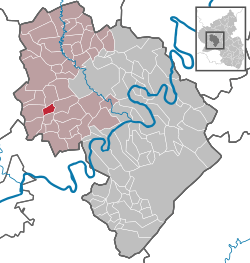Gladbach, Rhineland-Palatinate
| Gladbach | ||
|---|---|---|
| ||
 Gladbach | ||
Location of Gladbach within Bernkastel-Wittlich district  | ||
| Coordinates: 49°56′05″N 6°46′07″E / 49.93472°N 6.76861°ECoordinates: 49°56′05″N 6°46′07″E / 49.93472°N 6.76861°E | ||
| Country | Germany | |
| State | Rhineland-Palatinate | |
| District | Bernkastel-Wittlich | |
| Municipal assoc. | Wittlich-Land | |
| Government | ||
| • Mayor | Oswald Wingender | |
| Area | ||
| • Total | 3.60 km2 (1.39 sq mi) | |
| Population (2015-12-31)[1] | ||
| • Total | 349 | |
| • Density | 97/km2 (250/sq mi) | |
| Time zone | CET/CEST (UTC+1/+2) | |
| Postal codes | 54518 | |
| Dialling codes | 06508 | |
| Vehicle registration | WIL | |
Gladbach is an Ortsgemeinde – a municipality belonging to a Verbandsgemeinde, a kind of collective municipality – in the Bernkastel-Wittlich district in Rhineland-Palatinate, Germany.
Geography
Location
The municipality lies in the Eifel and belongs to the Verbandsgemeinde of Wittlich-Land, whose seat is in Wittlich, although that town is itself not in the Verbandsgemeinde.
History
The municipality’s first documentary mention goes back to directories of holdings at the Abbey of Echternach. At the end of the 8th century, a kingly estate (“fisci”[2]) named Dreyse (Dreis) on the river Salmana (Salm) was donated to the Abbey by Charlemagne’s brother Carloman. To this estate also belonged a few nearby places.
On 28 October 895, King Zwentibold acknowledged the Abbey’s holdings after being requested to do so by Archbishop of Trier Ratbold. Listed in this directory of holdings is, among other places, Gladbach.
Gladbach was a lordly domain of the Duchy of Luxembourg and was assigned to the lordship of Bruch. In Gladbach and nearby Bruch, unlike the development in Dreis, the Abbey of Echternach could not extend its lordly authority, as the river Salm formed the boundary between the Duchy of Luxembourg and the Electorate of Trier. Gladbach and Bruch lay on the Salm’s right bank, putting them on the Luxembourg side.
Beginning in 1794, Gladbach lay under French rule. In 1814 it was assigned to the Kingdom of Prussia at the Congress of Vienna. Since 1947, it has been part of the then newly founded state of Rhineland-Palatinate.
Politics
Municipal council
The council is made up of 8 council members, who were elected by majority vote proportional representation at the municipal election held on 7 June 2009, and the honorary mayor as chairman.[3]
Mayor
The mayor is Oswald Wingender (independent), who was elected on 13 June 2004 with 96.7% of the vote.
Coat of arms
The German blazon reads: In Blau auf einem goldenen Wellenschildfuß, darin ein roter Wellenbalken, ein gekürzter goldener Abtstab, begleitet rechts und links von je einem silbernen fehförmigen Eisenhut.
The municipality’s arms might in English heraldic language be described thus: Azure issuant from base a abbot’s staff Or between two vair pips argent in fess, in a base wavy of the second a fess wavy gules.
Culture and sightseeing
- Flour mill on the Gladbach (also the local river’s name), mentioned in a written record in 1409
- Oil mill, newly built in 1785
- Martinsbrunnen (fountain)
References
- ↑ "Gemeinden in Deutschland mit Bevölkerung am 31. Dezember 2015" (PDF). Statistisches Bundesamt (in German). 2016.
- ↑ This would be the form in the nominative plural or genitive singular in Latin. The “base form” – the nominative singular, would be “fiscus”.
- ↑ Kommunalwahl Rheinland-Pfalz 2009, Gemeinderat
Sources
- Andreas Wisniewski: Kreisjahrbuch Bernkastel-Wittlich. o. J.
_COA.svg.png)